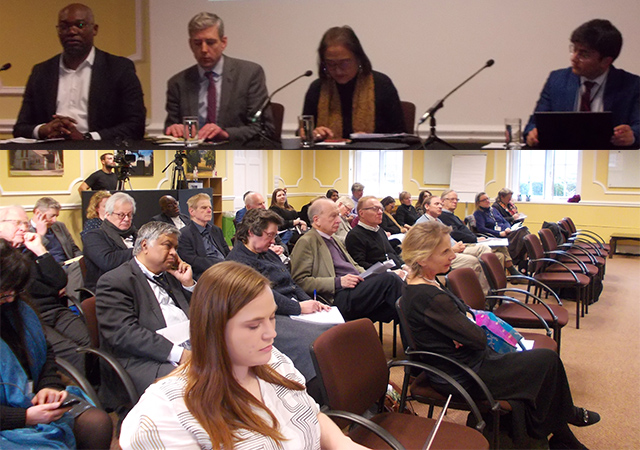 [top] Conference panel two: Dr Olumide Abimbola, Dr Nicholas Hardman-Mountford, Rita Payne, Abhir Bhalia. [bottom} The audience on day one. Harriet Aldrich at the front [photos: Debbie Ransome]
[top] Conference panel two: Dr Olumide Abimbola, Dr Nicholas Hardman-Mountford, Rita Payne, Abhir Bhalia. [bottom} The audience on day one. Harriet Aldrich at the front [photos: Debbie Ransome]
On the 18-19th January 2023, the Round Table Journal convened a conference at Cumberland Lodge. Aiming to look beyond the Commonwealth bubble and consider the organisation in its global context, participants posed probing questions about its role in a modern world filled with formidable transnational challenges. Attended by over 40 people from across academia, NGOs, government and the Commonwealth Secretariat, attendees were nonetheless united by an investment in what the future for the Commonwealth might, and should, look like.
Over the course of four panels and several keynote speeches there was a profound sense of urgency. Speakers situated their words within a context of spiralling ‘polycrises’: climate change; war in Ukraine; growing fuel and food costs; global inflation; rising authoritarianism; insular nationalism; and the continued impact of the pandemic, to name a few.
In the face of these daunting challenges, participants grappled with assessing an organisation which they viewed as having significant potential to make a positive contribution to the world. As a voluntary organisation whose 56 members constitute a network spanning huge regions of the globe, the Commonwealth has a unique ability to foster multilateral solutions to substantial global challenges. Speakers highlighted key Commonwealth successes, most notably the 56-country sustainable ocean agreement known as the Blue Charter, and in her conference address the Secretary General lauded the provision of legal ‘toolkits’ to member countries to help them enact climate legislation and reinforce democratic principles.
Pre-CHOGM 2022 conference – Is the Commonwealth working?
CHOGM 2018 outcomes
Rwanda: Africa’s CHOGM?
However, despite these achievements, it was clear that many participants felt that the Commonwealth was falling short in its attempt to be a truly impactful force. In an ostensibly values-centred organisation, there have been conspicuous lapses in consensus on crucial positions taken by the Commonwealth, most notably the absence of nine member countries from the statement condemning the Russian invasion of Ukraine. The lack of strength displayed by the Commonwealth over key issues of democracy and human rights was a concern for several speakers, as it calls into question its ability to stand for and insist upon adherence to key values. This is especially pertinent as the organisation seeks to admit new members.
Concerns were therefore raised about the Commonwealth’s real-world impact, beyond high-level agreements and ‘talk’. While the Secretary General emphasised the actionable and practical nature of Commonwealth initiatives and the tenacious behind-the-scenes work being conducted to encourage ethical governance globally, this was met with some measured scepticism. A notable example came from President of the Commonwealth Lawyers Association Brian Speers, who noted in his speech that while legal toolkits relating to the Latimer House Principles and separation of powers had indeed been made accessible to member countries, to his knowledge they had yet to be used.
Commonwealth Secretary-General Baroness Scotland delivers the conference keynote address and discusses isues in a Q&A session and a Round Table interview
This lack of concrete action, or the perception of it, is particularly damaging in relation to climate change. Panellists like Dr Olumide Abimbola (Executive Director of the Africa Policy Research Institute) view the Commonwealth as a remarkable global forum for the creation of trackable climate goals, but nevertheless express frustration at its lack of momentum or political will to enact the swift, radical changes which would make a real difference in the climate emergency.
This lack of impact perceived by participants is not the whole picture, as examples of the Commonwealth providing tangible benefits through its climate agenda can be clearly seen through initiatives like the Blue Charter Project Incubator, which is a key provider of accessible funding for member-countries’ own climate projects. However, this illustration of the Commonwealth’s dynamism simultaneously serves to highlight the severe lack of public knowledge surrounding its work. Even at this conference, in a room of individuals invested in the Commonwealth, some of the organisation’s biggest successes were largely unknown to the audience, serving as a stark illustration of the dearth of publicity surrounding Commonwealth initiatives.
This lack of public knowledge not only erodes the Commonwealth’s soft power and influence on the global stage, but it also makes encouraging youth engagement increasingly difficult. Yet before the Commonwealth can commence its struggle to remain relevant to wider youth populations, it needs to properly engage with the young representatives currently invested in its various bodies and forums. As a youth adviser to the Commonwealth Human Ecology Council, Abhiir Bhalla emphasised the importance of moving beyond the perfunctory consultation of youth in Commonwealth discussions, and instead actively incorporating the ideas and priorities of young representatives into the strategic decisions being made now. As Bhalla stated, when the impact of key policy decisions will be felt in 20 years’ time, youth need more than simply a seat at the table, they need a ‘say at the table’.
The Commonwealth has clearly contributed positively to the global political landscape in recent years. However, with climate deadlines looming, authoritarianism rising, and inequality increasing, the Commonwealth needs to tackle these varied crises with the urgency and decisiveness they require.
Harriet Aldrich is a member of the Round Table Editorial Board.
[This article will be updated with videos from the conference sessions as they become available.]
Related articles:
Commonwealth global challenges: Keynote speech
An Ocean of Opportunity: Commonwealth Blue Charter: Ocean Action Report
We must shift the global financing system in the age of climate change
Pre-CHOGM 2022 conference – Is the Commonwealth working?



